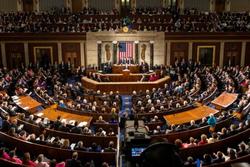 The US Senate’s vote to curb President Donald Trump’s power to attack Iran without congressional approval shows that both chambers in Congress are finding a strong political will to resist Washington’s move toward engaging in a war with the Islamic Republic, says an American political commentator.
The US Senate’s vote to curb President Donald Trump’s power to attack Iran without congressional approval shows that both chambers in Congress are finding a strong political will to resist Washington’s move toward engaging in a war with the Islamic Republic, says an American political commentator. RNA - Daniel McAdams, the executive director of the Ron Paul Institute in Texas, made the remarks during a Friday edition of Press TV’s The Debate program while commenting on the Senate’s vote to limit Trump’s authority to wage war on Iran despite his warnings against the measure.
On Thursday, the Senate voted 55-45 to pass a bipartisan war powers resolution, rebuking Trump for ordering a strike last month against a top Iranian military commander which was followed by Tehran’s retaliation.
“It’s a symbolic gesture; this is nothing that will restrain the president in reality if he decides he wants to attack Iran, but as a symbolic gesture it’s very powerful because it symbolizes the fact that both houses of Congress are finding the voice and political will to resist its move toward war with Iran and that is its real value,” McAdams told Press TV.
Asked about Trump’s tweet that the resolution would show the US weakness to the world and that he would veto it, McAdams said, “Congress has the authority to determine war not the president, so when the Congress asserts its constitutional authority over the issue of war and peace, if the president ridicules that it is showing weakness to the world…It sounds like he prefers the exact kind of strongman, a one-man rule over the issues of war and peace and governance.”
The resolution was introduced by Sen. Tim Kaine (D-Va.) after a drone strike, conducted by direct order of Trump, martyred Iranian anti-terror commander Lieutenant General Qassem Soleimani and several of his companions outside Baghdad International Airport.
The January 3 strike assassinated Soleimani, the former commander of the Quds Force of Iran's Islamic Revolution Guards Corps (IRGC), along with Abu Mahdi al-Muhandis, deputy head of Iraq’s Popular Mobilization Units (PMU), known as Hashed al-Sha’abi in Arabic, and their companions.
Both commanders were admired by Muslim nations for eliminating the US-sponsored Daesh Takfiri terrorist group in the region, particularly in Iraq and Syria.
Asked whether the assassinations were the Trump’s most reckless foreign policy decision in the Middle East, McAdams said, “This has beaten out the idiotic idea of firing a hundred missiles into Syria based on a lie, this beats that one out by a long shot… because President Trump has decided to surround himself with the same morons who are responsible for lying us into the Iraq war.”
Michael Lane, the founder of American Institute for Foreign Policy from Washington DC, was the other panelist invited to The Debate program who pushed back against the idea that the bipartisan resolution would serve as a “hindrance” to Trump.
“It’s not likely to be a hindrance to president Trump...he will veto it and will not restrain him in any way, shape or form vis-à-vis what he wants to do in terms of conducting his foreign policy in the region,” Lane said.
Soon after General Soleimani’s assassination, Leader of the Islamic Revolution Ayatollah Seyyed Ali Khamenei said Washington was to face a “harsh revenge” for the atrocity.
On January 8, the IRGC unleashed volleys of ballistic missiles at the American military airbase of Ain al-Assad in Iraq’s Anbar Province, which housed US forces. The Leader later described the retaliatory strikes as “only a slap.”
The US assassination of the top Iranian commander sent shock waves across the world while, at the same time, forging greater unity in the region against US interventionism.
Iraqi lawmakers also took action by unanimously approving a bill, demanding the withdrawal of all foreign military forces led by the United States from the country.
847/940